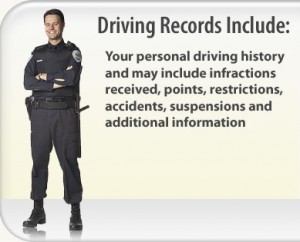Your driving records can be used by several different agencies for different purposes. Most commonly, the Federal or State governments use it to monitor your driving habits. How a particular offense is treated may vary from one state to another. For example, some states consider driving under influence a misdemeanor, which means that you lose points and could lose your license, if your commit repeated offenses. Some states follow the ‘three times and you are out’ policy. Other states treat DUI as a criminal offene, which means that it would appear, as such, on your driving record and could affect your employability. Other driving offenses that are of a criminal nature include hit and run or motor homicides.

Your driving records play an important part in several other things, such as how much insurance you have to pay or even your employment prospects. Insurance companies decide on the premium amount that you have to pay based on your previous record of accidents or offenses. Hence, if you have offenses such as DUI on your records, then your motor vehicle insurance premiums would go up significantly.
Employers also like to know everything they possibly can about a prospective hire before they finally recruit him. One of the checks done by employers is a check of driving records. If you have a criminal offesce listing on your driving record, then chances are that the company will not hire you, as they may have doubts about your ability to handle responsibility. For business owners who run transportation services, a search of the driver’s record is crucial, as they would have to trust their motor vehicles to the driver’s care for carrying passengers or goods from one place to another.
For an individual, it is possible to get driving records either through a written or email request followed by a personal visit to the DMV offices. Another method of getting this information is through using authorized third parties online who can get the records for you. There are, however, certain restrictions as to who can get this information. Some states have strict laws that protect the privacy of their residents and this information can only be given to an insurer or a genuine employer on producing sufficient proof of the need for it. This is done to prevent third parties from getting access to the personal details of the individual and using it for unauthorized purposes, such as email marketing campaigns.
Recent Comments